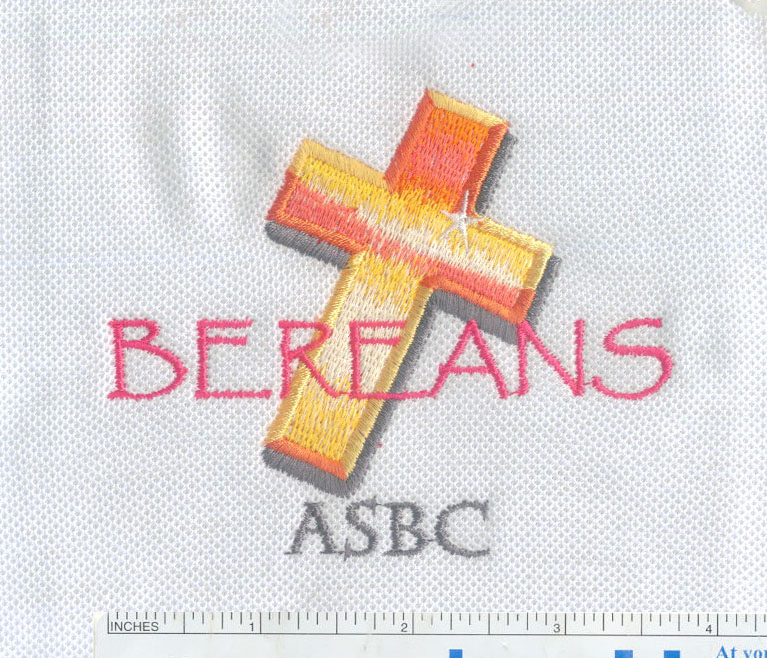Digitizing Logos for New Year Events: Making Every Stitch Count
As the calendar turns its pages, heralding the arrival of a new year, businesses and organizations are gearing up for celebratory events to mark the occasion. One of the key elements that can elevate the festive atmosphere is the incorporation of custom logos through embroidery. Digitizing logos for New Year events is a meticulous process that involves translating brand identity into stitched works of art. In this blog post, we'll explore the intricate world of logo digitization, offering insights into the process and tips to ensure that every stitch counts, making the New Year celebration truly memorable.
1. The Essence of Logo
Digitization: Translating Brand Identity
Understanding
Logo Elements:
● Color Palette: Consider the color scheme of the brand logo and how it can be
effectively translated into embroidery. Opt for vibrant threads that capture
the essence of the brand.
● Intricate Details: Take note of any intricate details in the logo, such as fine lines or
small text. These elements require careful attention during the digitization
process.
Choosing
the Right Embroidery Software:
● Professional Software: Invest in professional embroidery digitizing software
that provides a range of tools for precision and customization.
● Compatibility: Ensure compatibility with various embroidery machines to maximize
flexibility in production.
Considering
Placement:
● Apparel vs. Accessories: Determine whether the logos will be embroidered on apparel, such as
uniforms or jackets, or on smaller accessories like hats or promotional items.
● Sizing and Scaling: Adjust the size and scale of the logo based on the placement, ensuring optimal visibility and aesthetic appeal.
2. Steps in the Digitization
Process: Crafting Stitched Masterpieces
Logo
Analysis:
● Stitch Type Selection: Choose appropriate stitch types for different elements of the logo.
Satin stitches for smooth surfaces, fill stitches for larger areas, and running
stitches for outlines.
● Layering Strategy: Plan the layering of stitches to create depth and dimension, ensuring
that each layer complements the overall design.
Conversion
to Stitches:
● Vector to Stitch Conversion: Convert the vector-based logo into stitches, taking into account the
density of stitches required for each area.
● Color Mapping: Assign thread colors to different elements, matching them as closely
as possible to the brand's color palette.
Testing
and Refinement:
● Sample Embroidery: Before mass production, create sample embroideries to assess the
appearance and quality of the logo.
● Refinement Process: Analyze the samples for any issues such as thread breaks, puckering, or distortions. Refine the digitized design accordingly.
3. Tips for Optimal Logo
Digitization: Quality in Every Detail
Simplify
Complex Designs:
● Streamline Details: For intricate logos, simplify certain details to ensure clarity in the
embroidered version. Too much complexity may not translate well in thread form.
● Text Legibility: Ensure that any text in the logo is legible at the chosen size. Adjust
fonts and letter spacing if necessary.
Consider
Fabric and Material:
● Fabric Compatibility: Different fabrics require different approaches. Consider the fabric's
texture and density when digitizing to prevent
issues like thread sinking or distortion.
● Density Adjustments: Fine-tune the stitch density based on the fabric type. Higher-density
stitches may be suitable for denser fabrics, while lighter fabrics may require
lower density.
Maintain
Brand Consistency:
● Color Matching: Strive for accurate color matching to maintain brand consistency. Refer
to Pantone or other color-matching systems to ensure fidelity.
● Logo Variations: If the logo exists in multiple variations (color, black and white, etc.), digitize each version separately for versatility.
4. Embroidery Machine
Considerations: Bringing Designs to Life
Machine
Capabilities:
● Embroidery Machine
Specifications: Familiarize yourself with the
specifications of the embroidery machines that will be used for production.
● Maximum Stitch Count: Be mindful of the machine's maximum stitch count, and optimize the
design to fit within these constraints.
Thread
and Needle Selection:
● Thread Quality: Choose high-quality embroidery thread
that not only matches the desired colors but also runs smoothly through the
machine.
● Needle Types: Select the appropriate needle type based on the fabric and the density of the digitized design.
5. Quality Control and Production
Efficiency: Balancing Perfection and Timeliness
Quality
Control Measures:
● Inspection Protocols: Establish a thorough inspection process for each embroidered piece,
checking for consistency, thread tension, and any defects.
● Feedback Loops: Encourage feedback from machine operators to identify and address any
recurring issues during production.
Efficiency
Considerations:
● Batch Processing: Optimize production by grouping similar items for batch processing.
This minimizes machine setup time and enhances overall efficiency.
● Machine Maintenance: Regularly maintain embroidery machines to prevent issues that may affect production quality and speed.
Conclusion: A Stitched
Celebration to Remember
In the realm of New
Year events, digitizing logos for embroidery adds a unique and personalized
touch that distinguishes a celebration. Each stitch represents the meticulous
effort to encapsulate brand identity in thread form, transforming a simple logo
into a stitched masterpiece. By understanding the intricacies of the
digitization process, considering placement and material, and implementing
quality control measures, businesses can ensure that their embroidered logos
contribute to a celebration that resonates with style and professionalism. As
the clock strikes midnight, may the embroidered logos symbolize not just a
brand but a commitment to excellence and a year filled with success. Here's to
making every stitch count in the grand tapestry of a New Year celebration!



